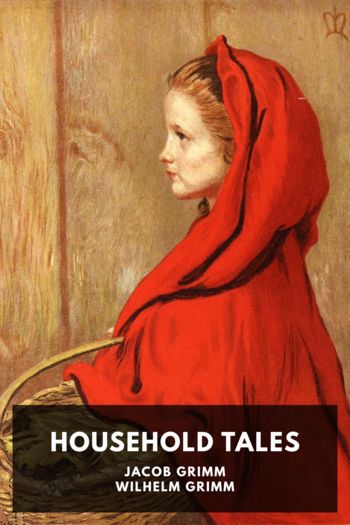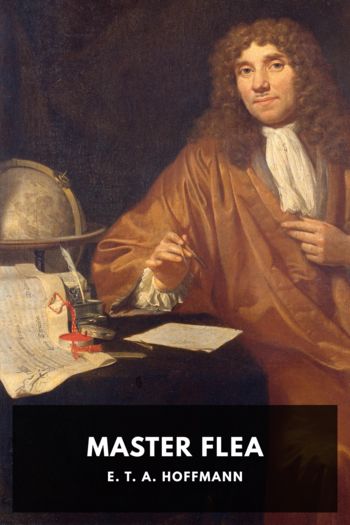Household Tales - Jacob Grimm (read me a book .txt) 📗

- Author: Jacob Grimm
Book online «Household Tales - Jacob Grimm (read me a book .txt) 📗». Author Jacob Grimm
When day broke, the master galloped to the castle on the stolen horse. The count had just got up, and was looking out of the window. “Good morning, Sir Count,” he cried to him, “here is the horse, which I have got safely out of the stable! Just look, how beautifully your soldiers are lying there sleeping; and if you will but go into the stable, you will see how comfortable your watchers have made it for themselves.”
The count could not help laughing, then he said, “For once thou hast succeeded, but things won’t go so well the second time, and I warn thee that if thou comest before me as a thief, I will handle thee as I would a thief.” When the countess went to bed that night, she closed her hand with the wedding-ring tightly together, and the count said, “All the doors are locked and bolted, I will keep awake and wait for the thief, but if he gets in by the window, I will shoot him.” The master-thief, however, went in the dark to the gallows, cut a poor sinner who was hanging there down from the halter, and carried him on his back to the castle. Then he set a ladder up to the bedroom, put the dead body on his shoulders, and began to climb up. When he had got so high that the head of the dead man showed at the window, the count, who was watching in his bed, fired a pistol at him, and immediately the master let the poor sinner fall down, and hid himself in one corner. The night was sufficiently lighted by the moon, for the master to see distinctly how the count got out of the window on to the ladder, came down, carried the dead body into the garden, and began to dig a hole in which to lay it.
“Now,” thought the thief, “the favourable moment has come,” stole nimbly out of his corner, and climbed up the ladder straight into the countess’s bedroom. “Dear wife,” he began in the count’s voice, “the thief is dead, but, after all, he is my godson, and has been more of a scapegrace than a villain. I will not put him to open shame; besides, I am sorry for the parents. I will bury him myself before daybreak, in the garden that the thing may not be known, so give me the sheet, I will wrap up the body in it, and bury him as a dog burries things by scratching.” The countess gave him the sheet. “I tell you what,” continued the thief, “I have a fit of magnanimity on me, give me the ring too—the unhappy man risked his life for it, so he may take it with him into his grave.” She would not gainsay the count, and although she did it unwillingly she drew the ring from her finger, and gave it to him. The thief made off with both these things, and reached home safely before the count in the garden had finished his work of burying.
What a long face the count did pull when the master came next morning, and brought him the sheet and the ring. “Art thou a wizard?” said he, “Who has fetched thee out of the grave in which I myself laid thee, and brought thee to life again?”
“You did not bury me,” said the thief, “but the poor sinner on the gallows,” and he told him exactly how everything had happened, and the count was forced to own to him that he was a clever, crafty thief.
“But thou hast not reached the end yet,” he added, “thou hast still to perform the third task, and if thou dost not succeed in that, all is of no use.” The master smiled and returned no answer. When night had fallen he went with a long sack on his back, a bundle under his arms, and a lantern in his hand to the village-church. In the sack he had some crabs, and in the bundle short wax-candles. He sat down in the churchyard, took out a crab, and stuck a wax-candle on his back. Then he lighted the little light, put the crab on the ground, and let it creep about. He took a second out of the sack, and treated it in the same way, and so on until the last was out of the sack. Hereupon he put on a long black garment that looked like a monk’s cowl, and stuck a gray beard on his chin. When at last he was quite unrecognizable, he took the sack in which the crabs had been, went into the church, and ascended the pulpit.
The clock in the tower was just striking twelve; when the last stroke had sounded, he cried with a loud and piercing voice, “Hearken, sinful men, the end of all things has come! The last day is at hand! Hearken! Hearken! Whosoever wishes to go to heaven with me must creep into the sack. I am Peter, who opens and shuts the gate of heaven. Behold how the dead outside there in the churchyard, are wandering about collecting their bones. Come, come, and creep into the sack; the world is about to be destroyed!” The cry echoed through the whole village. The parson and clerk who lived nearest to the church, heard it first, and when they saw the lights which were moving about the churchyard, they observed that something unusual was going on, and went into the church.
They





Comments (0)